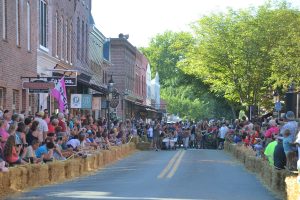
BERLIN — While special events are one of the many areas of spending that have drawn criticism from residents during Berlin’s recent budget discussions, merchants continue to tout their importance.
During recent budget discussions, residents have questioned the importance of special events, which cost the town roughly $90,000 a year. The business they bring to downtown shops often comes with traffic residents have to deal with, street closures and trash town employees have to clean up.
Downtown merchants, however, say Berlin’s special events bring them anywhere from a 20% to 500% increase in business. According to Steve Frene, president of the Berlin Chamber of Commerce, each event brings an immediate return on investment — with increased sales the day of the event — as well as a long-term benefit, as tourists who were drawn to town by an event return in the future to shop.
“Once you visit Berlin, you always come back,” Frene said.
As the town faces the biggest financial challenges it’s experienced in years, citizens have come out to protest what they consider frivolous spending. Some have called for the sale of Berlin Falls Park while others have simply asked for more budget cuts as officials consider the mayor’s proposed 29% property tax increase. Several residents have brought up the issue of town events as expenses have been discussed.
“I’d like to know, what is the benefit to residents?” resident Sue Beaman said.
Beaman, who lives on West Street, says she’s stopped attending Berlin’s events in recent years as they’ve become more frequent and more crowded. She’s frustrated by the fact that visitors park on both sides of her street, making it hard for emergency vehicles to pass through, and have even blocked her driveway in the past.
“When I started here 21 years ago, the town had a few quality events and not all involved drinking,” Beaman said, adding that she valued quality over quantity.
She commended the clean-up efforts of town staff after each event but pointed out those efforts came at a cost.
“These are tourists coming to town,” she said. “They may or may not come back. What does that benefit the residents?”
According to Ivy Wells, the town’s economic and community development director, the town only began tracking the exact costs associated with various events two years ago. Now, however, each event’s labor, support and vehicle costs are recorded. While some events are technically not hosted by the town, they still result in costs to the town through clean-up or support. The Peach Festival, which is hosted by the Calvin B. Taylor House Museum, cost the town $2,245 in 2018 because support was provided by the town’s economic development, police, administration, electric and water resources departments. The Berlin Fiddlers Convention, which is a chamber event, cost $8,568. Even Halloween cost the town $5,422, with the majority of that — $4,405 — in police expenses. The most expensive event, which the town only took over in recent years, is the Berlin Christmas Parade. The event cost $18,996 in 2018.
Wells — who points out that her role in town is to foster economic and community development — maintains that the multitude of events benefits those who live in town as well as those who run shops in town.
“The events not only benefit the business community but they bring community to the residents,” she said. “It’s a chance to see your neighbors. It really brings the entire community together.”
Frene, who’s been involved in the Berlin business community for more than two decades, said that years ago events in Berlin were primarily handled by downtown merchants.
“Our events were done by businesses to bring visitors to town,” he said. “One of the things we found was that if you held an event, people would come to town, many for the first time.”
In recent years, Frene said the town had added events geared more toward residents. He said the fireworks and Touch a Truck day, for example, did little for businesses. He stressed that until this spring’s budget discussions, the town’s business community had no idea what Berlin’s events cost the town. Though the chamber never had any surplus funds in the past, during the last few years, with its ability to sell alcohol at certain events, it has accumulated some extra cash. In recognition of that, the chamber donated $5,000 to the town at its last installation dinner. Going forward, Frene said the chamber would work closely with the town to provide further financial support for events.
“We are certainly willing to do that in the future because for the first time we’ve been made aware of what the costs are,” he said. “We don’t want to burden the town or the residents. What we propose to do is work with the town.”
If the town’s clean-up costs are significant, for example, he said the chamber could explore contracting the task out.
“We’re business people,” he said. “We know how to make money and conserve money. When we lose money, we don’t have the luxury of raising taxes.”
He added that the business community was committed to partnering with the town.
“The beautiful thing about Berlin is we work together to solve problems,” he said.


